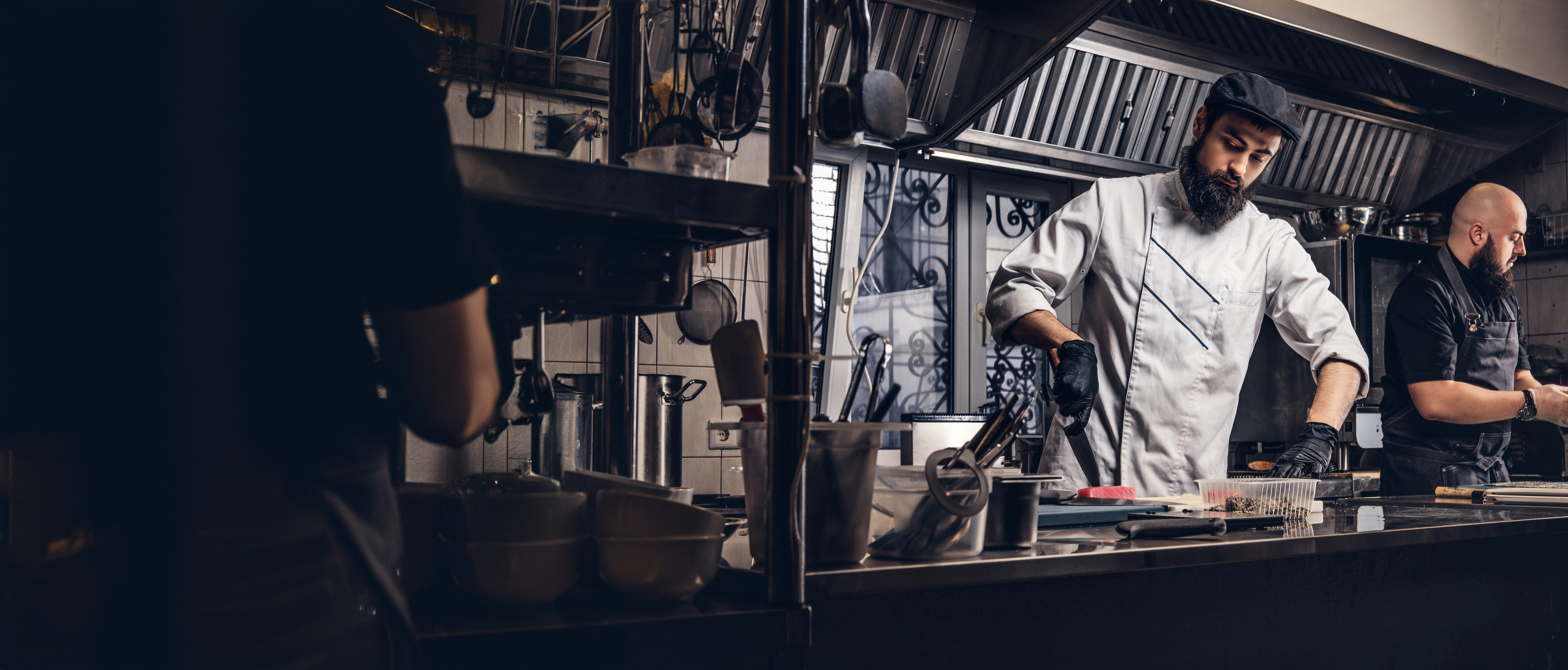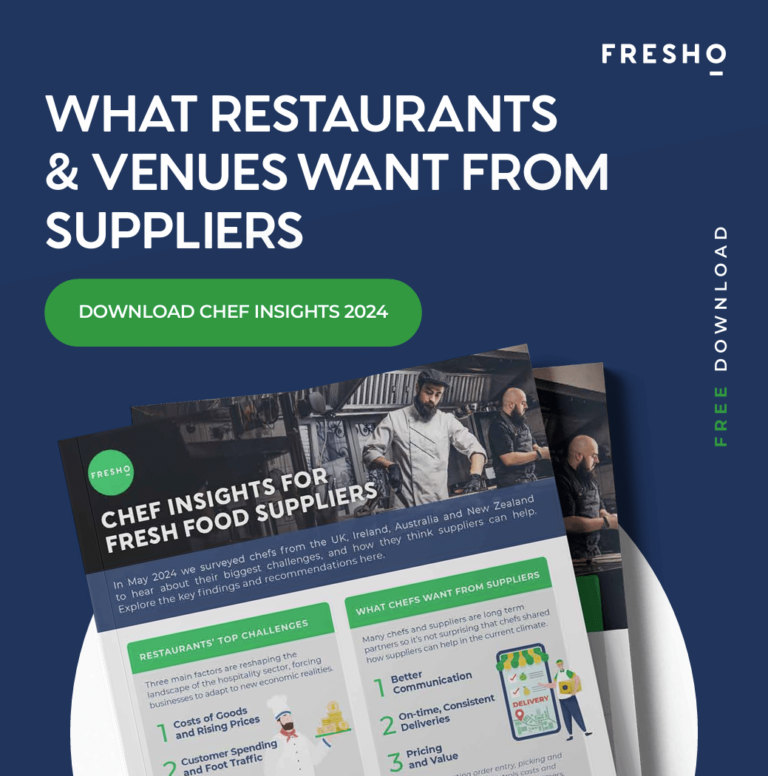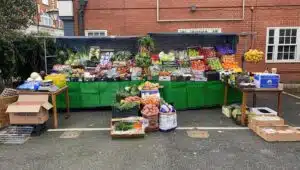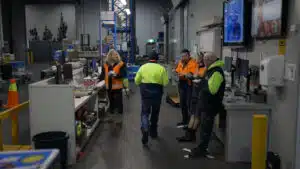Few would disagree that 2024 has been a year of challenges in the restaurant industry, with a range of issues impacting operations and profitability. Whether it’s food price inflation of almost 6% in the UK, a 4% drop in foot traffic (Australia) or staffing issues (just about everywhere), Chefs and venue operators are feeling the pain.
We wanted to understand what 2024 feels like behind the data so we surveyed thousands of Chefs in the UK, Ireland, Australia and New Zealand in May 2024. Some respondents use Fresho for order management, others do not. They represent restaurants, bars, cafes, hospital and school canteens, and other venues.
Internal and External Forces are Reshaping Hospitality
According to the data, the biggest challenges in the restaurant industry today include the rising cost of goods, fluctuating customer spending and staffing shortages. These factors are reshaping the hospitality landscape, forcing businesses to adapt to new economic realities.
Cost of Goods and Rising Prices
The greatest challenge reported by Chefs is the increasing cost of goods due to inflationary pressures and supply chain disruptions. Price volatility was also singled out. (For context, food prices in Australia have increased by 6.1% over the past year, and the UK has seen similar trends with a 5.9% rise). This affects menu pricing and margins, compelling venues to find innovative ways to manage expenses while maintaining quality. Managing food loss and wastage, and the economics of menu development are front of mind in the industry.
Declining Customer Spending and Foot Traffic
Just behind cost pressures, Chefs identified spending patterns and foot traffic as a challenge, driven by economic uncertainty and changing consumer behaviours. Over 75% of respondents have seen changes in spend over the past year, as customers reduced spend or sought better value. Other data has shown that restaurant sales in the UK have dipped by 3% on last year, and Australian eateries have reported a 4% decrease in foot traffic. This highlights the importance of providing real value at every price point and an outstanding experience that goes beyond food alone.
Staffing Issues are Among the Biggest Challenges
Labour shortages remain a critical issue, and make up the Top 3 challenges this year, with restaurants struggling to find and retain qualified staff. Chefs reported this in relation to both skilled and unskilled workers.
Other research has shown that 40% of UK restaurant owners have difficulty with staffing, while the figure is at 45% in Australia. Hospitality would usually respond by offering better benefits and training to attract talent, but cost pressures make this difficult.
Other Challenges in the Restaurant Industry
In addition to these difficulties, Chefs also cited:
- Supplier management, including product availability and logistics issues
- Quality control at a time of cost pressure
- Compliance with regulations in general and evolving dietary needs in particular. 41% of Chefs surveyed have seen an increase in customer-specific dietary requirements, continuing a long -term trend
- Meeting customer expectations against the backdrop of all these factors
These challenges highlight the need for business models and strategies to help navigate the industry landscape.
Three Ways Wholesale Food Distributors Can Help Chefs
At their best, relationships between Chefs and suppliers are long term and win-win. Whether you think of fresh food wholesale and hospitality as parts of a supply chain or as a community, there is no denying the close links. So, it’s not surprising that the Chefs in our survey shared how suppliers can help them in the current climate.
What is surprising, though, is that lower prices were not top of the respondents’ wish list.
Better Communication
This was the Chefs’ biggest ask, and need not be an expensive one for suppliers to deliver on. When we asked Chefs to elaborate on what they meant by ‘better communication’, they specified
- Real time updates on specials and price changes
- Pre-delivery confirmation of out of stocks and substitutions
- Face to face visits to develop relationships and share market information
On-time, Consistent Deliveries
Chefs told us that they want their deliveries at the agreed time – preferably early in the day – and that they at least expect to be kept informed of delays. Some are frustrated when delivery instructions (like how to get access, or where to leave products) are not followed, making this one of their biggest challenges.
Pricing and Value
Unsurprisingly, given the challenging environment, venues will favour suppliers that are competitive on price. Apart from lower prices and price matching, Chefs identified transparency around pricing, discounts on volume or on regular items, and ease of access to specials as being helpful to them. Some also highlighted minimum order quantities as a barrier to buying.
The Last Word From Chefs
Communication, delivery and price were the main preoccupations of those we surveyed. But Chefs also reminded us of the importance to them of:
- Product quality, including care in picking orders
- Consistency in product availability
- Personalised service, with sales reps that can add value
- Sustainability, especially in reduced, recyclable or returnable packaging. 19% of respondents also reported their own customers becoming more environmentally conscious compared to a year ago
- Use of technology like allowing online ordering and integration to finance systems
Fresho helps suppliers to provide the service their customers expect in these areas.
Like to know more? If you’re a fresh food wholesaler committed to offering great customer service, get a free demo of Fresho by clicking the button above.











